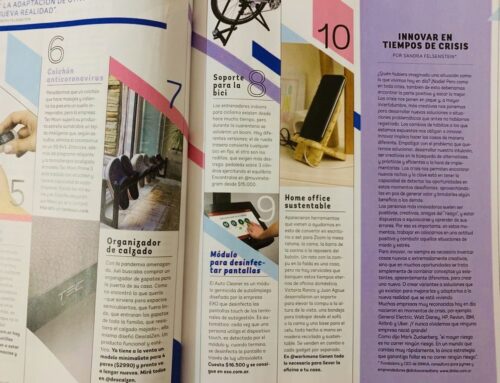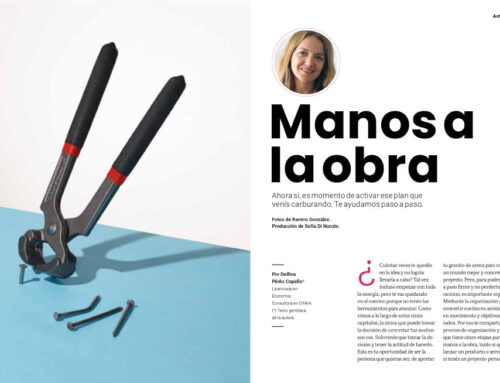Stagflation and exchange rate volatility impact business plans. Meanwhile, small and medium-sized companies must tighten their belts. The keys to growing, despite the context.
By Facundo Sonatti
If Argentine businessmen are trained in one thing, it is in driving on winding roads. It warrants greater attention and adjusting the belt to avoid a drastic impact. Federico Baigun, co-founder of Reina Batata, a boutique bazaar chain, postponed the openings of new stores and reduced his staff by 10% this year. “Due to inflation, we adjust both prices and costs as realistically as possible to be competitive and continue managing the volume we want,” he assures and adds that, to achieve this, it is key to monitor the numbers and, in the face of deviations that arise, adjust the course quickly, to maintain the volume or gross profit of the business.
For Sandra Felsenstein, director of the consulting firm for SMEs Dinka, in times of crisis, it is natural for smaller companies to pull back their expenses and investments and implement savings measures. On the other hand, it often happens that necessity leads companies to search for efficiency, which could be the positive aspect of these situations (see box).
"When reducing costs, it is essential to try to simplify the processes. Not only to reduce the company's expenses but also the superfluous ones that do not generate added value to the final product, increasing the cost, and with it, the price. This means reducing as much as possible the internal bureaucratic processes that use time and resources that do not translate into advantages or benefits for the consumer," recommends the specialist.
"We audited all areas to understand where we could improve to be more profitable. Expenses on advertising and external consulting were more relegated," says Gisella Djenderedjian, CEO of Dvigi, the purifier firm that she inherited from her father and has increased its real sales by 60% so far this year. At the beginning of this year, the company hired consulting services in online advertising. "In the middle of the year, we trained one person on the team to carry out this task. We managed to internalize concepts, reduce consulting costs and improve results by 40% (sales/advertising investment)," he details.
Gabriel Fama, head of the Cadore ice cream parlor, states that the situation forced him to reduce his staff by 15% in the low season. Salaries represent the second component of costs for the company. “We signed an agreement with a 35% increase with a direct impact on social charges, ART, social works and union contributions,” says Fama and affirms that, despite the progressive drop in profitability, sales volumes are maintained.
Cadore became famous based on an artisanal product, in the epicenter of cinemas and theaters in Buenos Aires at the end of the 1950s. Today, it remains in its traditional location on Corrientes Avenue and produces more than 30,000 kilos per season. "The quality and craftsmanship, the dedication we put into production, distinguishes us and ensures that sales volumes do not decline. Without forgetting the word-of-mouth recommendation of our ice creams," adds the businessman.
"Our main activity, Temporary Personnel, is an indicator of the moods of the economy. When tailwinds blow, we are the first to rise, and when drops of drizzle are felt, we are one of the first lines of cuts for our clients. Therefore, we have to have a lot of waistline in difficult times and everything that is not a critical expense, regardless of the area, is thoroughly reviewed," says José Ignacio de Artiagoitia, founder of Dos Servicios Eventuales, human resources consulting firm, founded more than 20 years ago, with 300 temporary employees and a turnover of $35 million.
"In this area, it is key to keep the financial indicators in order. By not managing raw materials or stock, we cannot defer payments to suppliers: the most important line of expenses, and therefore critical, is Salaries," explains the businessman. "Therefore, we began with strong work in managing collections and managing cash flow. The companies' payment chain feels heavier, so liquid cash became a critical factor," he adds.
"An action that triggers this type of period is the stagnation in the hiring of personnel and, sometimes, the subsequent dismissal of collaborators. In many cases, the owners of SMEs evaluate this as I can do it, I can start taking on more tasks for the company, etc. We must be very careful with this, and not forget that the entrepreneur's time is worth a lot, it has a very high opportunity cost, and that it is essential that he not abandon his dedication to production of the company's strategies to dedicate itself to operational tasks," warns Felsenstein.
"The fiscal pressure is very important and financing lines are increasingly cut. However, we hope to meet this year's budget and, in the best of cases, add clients," they share from Dos Servicios Eventuales.
Common denominator
- Contraction in investment in advertising and marketing. SMEs use tools that allow them to manage the relationship with customers without the need to invest too much
- The two sides of the inventory. In some cases it is decided to reduce the stock. On the contrary, in other firms, the constant increase in their replacement costs generates increases in stock. This depends on the financial capacity of the firm.
- Despair to sell more. It is common to see entrepreneurs desperately trying to increase sales as if to counteract the decline in results. The focus should be on optimizing the performance of SMEs.
- Source: Dinka







